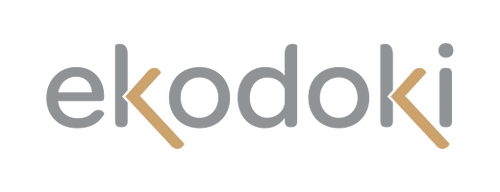Cork and Hanji, from Bark to Bag
A Responsible Harvest
FSC-certified, eKodoKi’s cork comes from the sustainably managed forests of the largest producer of cork in the world, Portugal – where there are enough cork oak trees today to last for over 100 years.
Cork barks regrow to become harvested every 9 years. During its lifetime, a cork oak tree can produce, on average, 15 bark harvests.
Why is cork harvesting a good thing to do? By stripping the cork oak tree from its cork bark, it is able to absorb much higher levels of CO2.
A Premium Eco-Fabric
The raw material is sliced by hand or machine to obtain slabs of regular shapes, in three usable layers. Only the middle section, dense and of the best quality, is used for making cork fabric.
Cork is laminated onto a backing material for strength; suberin, the resin present in the cork, is used as natural glue. No heavy metals, organic solvents, mineral fibres, nor formaldehyde are involved.
The thin cork sheets are assembled in various pattern designs – marbleized, striped, flocked (agglomerated) – where various natural tones of cork are combined to create further effects. No artificial dye is applied to our cork fabrics.
A Traditional Craft Process
Hanji, the traditional paper from Korea, is crafted from fibres sourced from the local mulberry tree. The process involves harvesting, bundling, boiling/steaming, washing, beating, forming into sheets, burnishing, and drying, all traditionally done by hand.
The bark of the mulberry tree comprises three layers. The inner layer, white in colour, is utilized for making hanji, manually scraped off with a knife. One of the reasons why hanji is incredibly strong is because this inner white layer contains long fibres.
Originally dating probably between the 3rd and 6th centuries, hanji is still produced by manual labour combined with modernized processes.
A Compostable Composite
‘Haunji,’ a brand from Hanwon Moolsan Corp, is a modern Korean eco-friendly textile that features a leather-like durable surface based on traditional hanji.
It is a composite fabric composed of hanji paper pulp (50%), cotton fabric pulp (50%), and a silicone-based coating material, Aqua Urethane, a non-toxic volatile adhesive.
Unlike petroleum-based artificial leathers, Haunji doesn’t contain toxic chemicals, and is compostable in professional composting facilities.
A Good Alternative Choice
Despite its spongy feel, cork fabric is a water and dirt repellent alternative to petroleum-based fabrics; and so is hanji textile. There are no reasons not to opt for a cork and hanji bag, even in a country where it often rains.
Cork and hanji are both a gift from nature, for people who love environmentally friendly materials and don’t want to compromise on quality or style.
eKodoKi cork and hanji bags not only have a unique look; both cork fabric and hanji textile happen to be surprisingly light, making them materials of choice for a daily commute bag – moreover, a good option as a vegan alternative, since the materials come from trees.
Manufacturers’ Certificates
Cork+Hanji Collection
eKodoKi works with rigorously selected manufacturers, based on criteria related to respect for the environment, animal welfare and working conditions – in other words, companies that do not use heavy chemicals, guarantee good working conditions with fair wages, do not harm animals and work according to reliable certifications. While we can't tick all the boxes with every manufacturer, we strive for continuous improvement.

FSC certified cork
Cork is a renewable natural material harvested from Portugal's oak forests, called Montado's, which are all FSC certified. FSC (Forest Stewardship Council) certification allows businesses and consumers to choose wood, paper and other forest products made with materials from well-managed forests and/or recycled sources.
The cork sheets are pressure bonded with a TPU film. TPU is a non-toxic material, it is a completely inert material and does not release VOCs (Volatile Organic Compounds), nor does it contribute to PH change in soil or water.

PeTA Approved Vegan
Our cork fabric, produced in South Korea, is certified PeTA Approved Vegan. This cruelty-free certification is designated for companies that have signed a statement of assurance verifying that they and their suppliers do not conduct, commission, or pay for any tests on animals for their ingredients, formulations, or finished products anywhere in the world and that they pledge not do so in the future.

Intertek certified “Haunji”
“Haunji” is Intertek test certified – no toxic chemicals are found. And with the decision of the ZDHC (Zero Discharge of Hazardous Chemicals) association to prohibit the toxic production of plastic-coated synthetic leather, “Haunji” meets the environmental needs of the synthetic leather market.

KCL Certified
Our cork fabric products have objective data certifications by KCL (Korea Conformity Laboratories), that upholds the highest standards in testing in South Korea.

Global Recycled Standard
The material used for the lining of the KWORK collection is “MIPAN© regen™” recycled Nylon, made from pre-consumer waste, and aimed at reducing waste to landfills and preserving petroleum resources. This material has achieved Control Union's Global Recycle Standard (GRS) certification.

KARA
Regarding animal welfare, our cork fabric manufacturing partner is working with animal rights advocates Kara.







